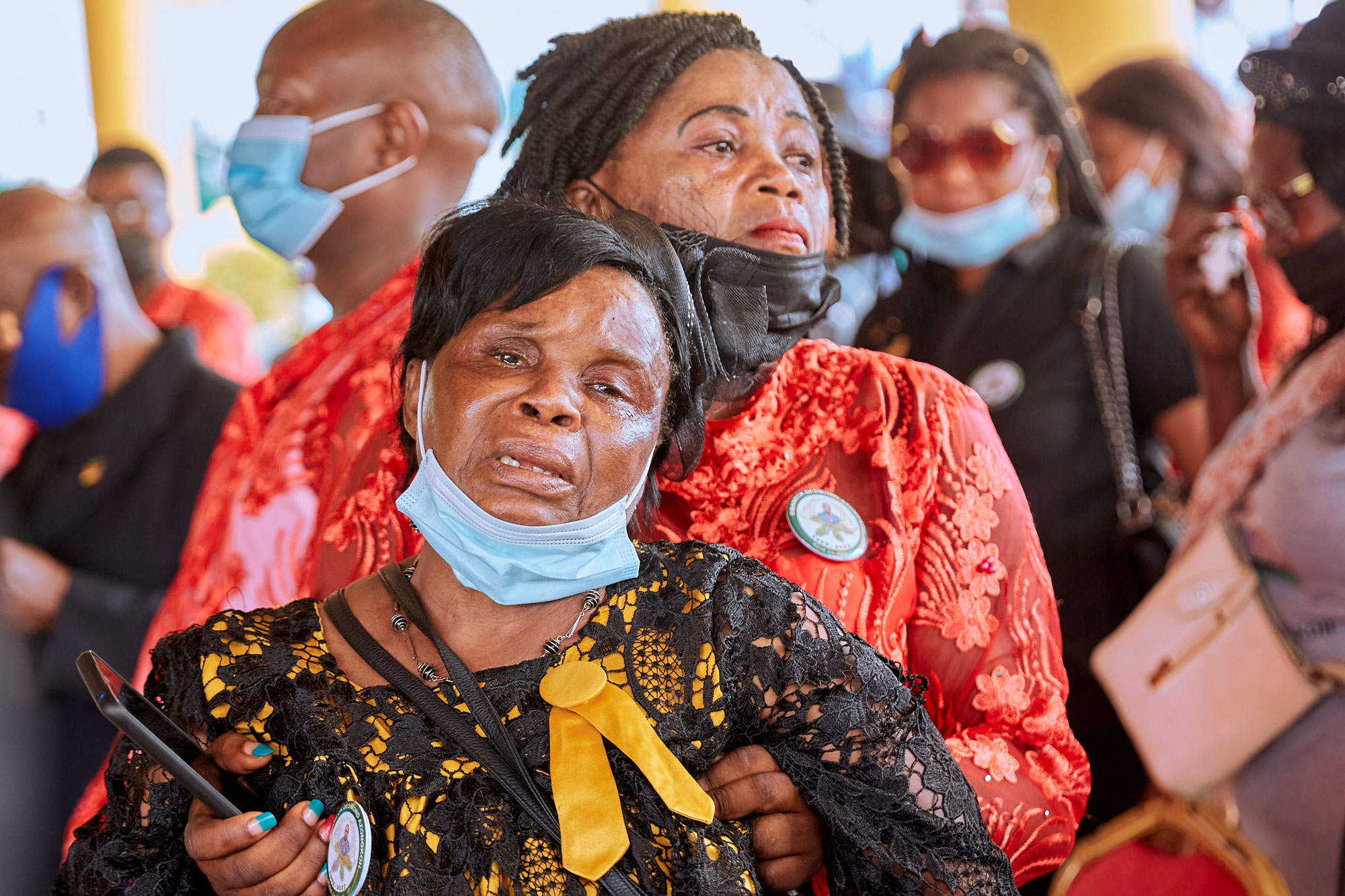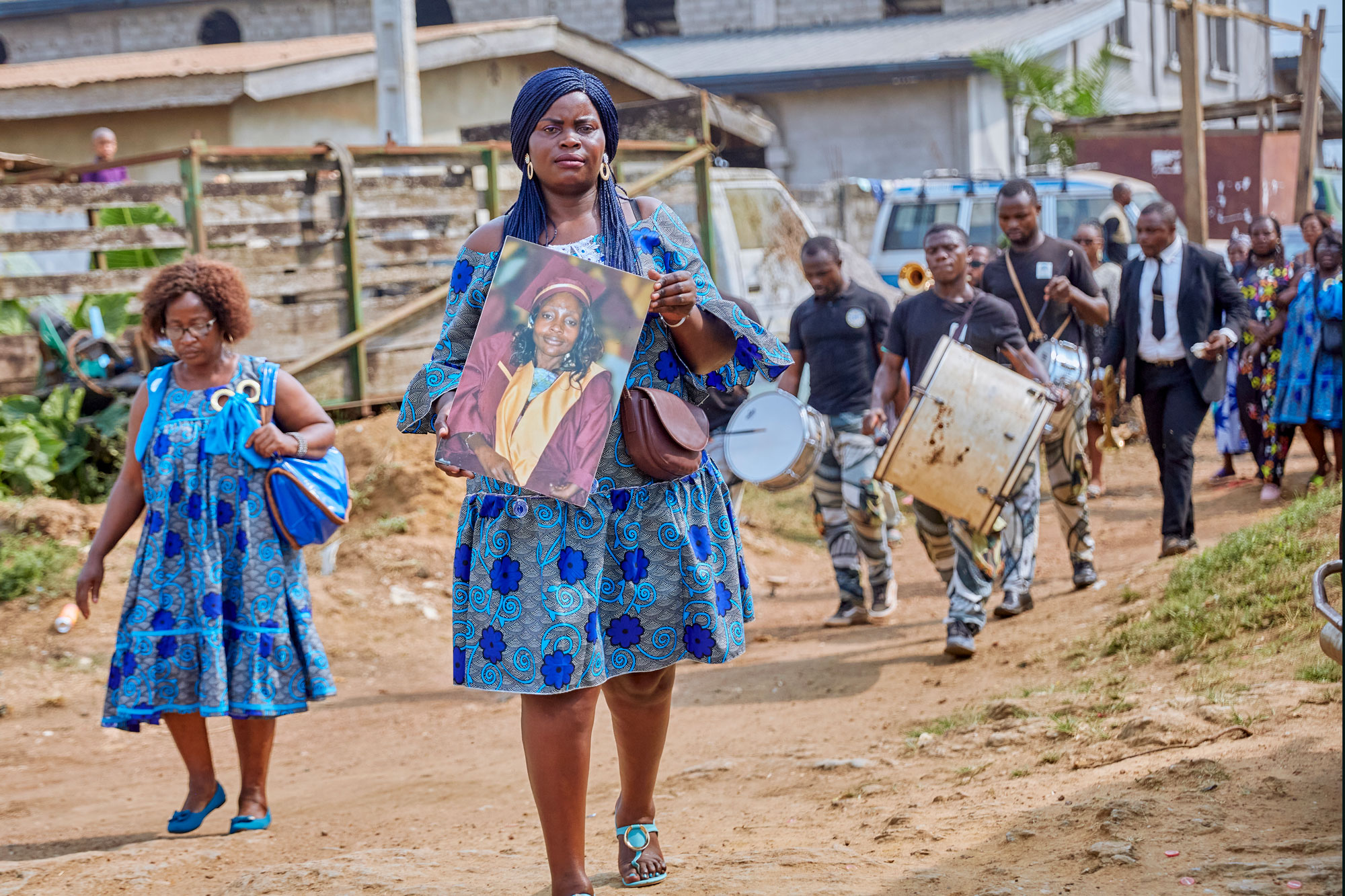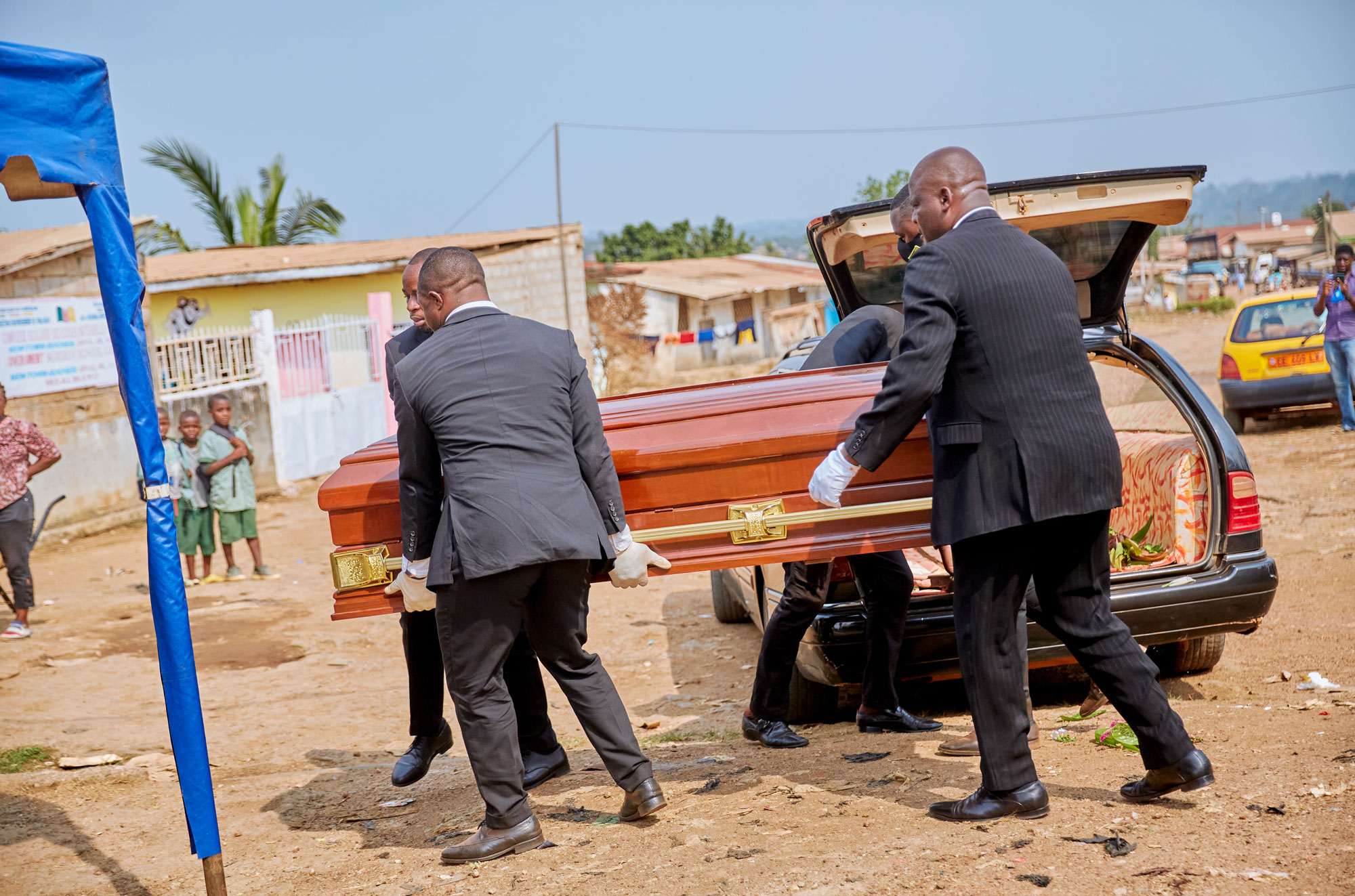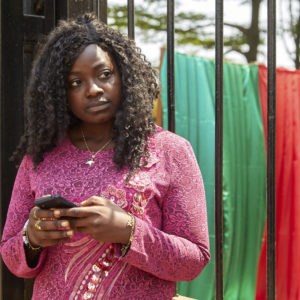Hearts break as Cameroon regime forgets the dead
The families of those killed in the Afcon stampede had to wait weeks before they could bury their loved ones. And while they did, the government’s promised help was nowhere in sight.
Author:
25 February 2022

“Since Desmond died, I have not been able to sleep,” said a distraught Agnes Ebaneck, the mother of Azongkoh Desmond Ebaneck. He was one of eight people who lost their lives in the Olembé Stadium stampede on 24 January ahead of Cameroon’s clash against Comoros in the last 16 of the Africa Cup of Nations (Afcon) in Yaoundé.
“Who will take care of me? How will I live?” Agnes asked repeatedly as her family prepared for the burial of the 29-year-old at Oshie village in the restive Northwest region of Cameroon, where an armed conflict between separatist fighters and the government has been waged since 2017.
A visibly pained and devastated Agnes was inconsolable as Ebaneck’s corpse left the mortuary before being taken to the Supreme Court, where members of the judicial fraternity paid their last respects to their colleague before his funeral on Saturday 19 February. Before his death, Ebaneck was a promising magistrate on the audit bench of the court in Yaoundé.
“I remember how I struggled to raise him to the level he reached,” Agnes lamented. “I feel sorry for him to have died in that manner. Who will take care of me? I had an eye infection. He took me to the hospital for treatment. The eye has started hurting. Who will help me out? Who will buy me cooking oil?”

Kumatoh Christa-Xavier, the mother of Ebaneck’s only child, a three-year-old girl, said the news of his death had been shocking and heart-breaking. She was watching the game on television at home in Bamenda, 373km from Yaoundé, when several people called to tell her about the incident. She said life without her daughter’s father was “going to be hell” because he had always been there for both of them.
Christa-Xavier said she had been talking to their daughter to get her to understand that her father had died. But “considering her age, she takes it as a joke. As time goes on, she will know that her dad is no more. She will have to cope with it.”
Ebaneck’s colleague, Halilou Bouba, described him as an exemplary patriot who loved his country as much as football, which he played well. Ebaneck had attended all the matches of the Indomitable Lions in the Afcon showpiece.
“He was the first to arrive at work,” said Bouba, “and one of the last persons to leave office. As a cadet of the audit bench, he was respectful, available and delivered tasks given by the hierarchy or by senior colleagues promptly. We, his colleagues, can testify to his humane character. His death leaves a big vacuum among us that we doubt will be filled.”
Agonising wait
The family of Véronique Dorothée Djilo also buried her only on 19 February as they had to wait weeks for her body to be released from the mortuary. The teacher and ardent football fan was the breadwinner in her family.
On its way to the family homestead in Mbalmayo, 48km south of Yaoundé, the small cortège stopped at the school in Essazok village where Djilo taught classical literature. Students and teachers emotionally paid their last respects.
In Mbalmayo, where Djilo was born, a freshly repainted house, four small canopies, plastic chairs and two audio speakers set the stage for her wake. As the funeral procession appeared, the wailing started. Djilo’s elder sister was inconsolable. The body was then transported to the West region and buried in Bandjoun after a final requiem at the Saint Esprit de Hok church.
Contacted for an interview, the man who coordinated Djilo’s funeral refused to talk on record. When he finally agreed to answer questions, he did so on condition of anonymity. He explained that the family was not comfortable with the media being at the funeral, but later it was revealed that the Djilos were concerned about getting into trouble with Cameroon’s government.

Many families of the dead have slammed the government for failing to support them during the burial processes of their loved ones, even though it pledged to do so when announcing an investigation into the stampede. No one has been brought to book for the incident, and those familiar with such “investigations” in Cameroon know that nothing is likely to come of it.
“Nothing!” the man said repeatedly when asked if the government had helped the Djilos financially. “The government withheld the corpses for investigations. Immediately when the Africa Cup of Nations concluded, we received a call asking us to come and collect our sister,” he said angrily.
Empty promises
This was echoed by Ebaneck’s brother Lawrence, who said neither the government nor the Confederation of African Football (CAF) had provided support for funeral preparations. “We are struggling on our own,” he said.
Lawrence said he learnt on social media of an alleged offer by Cameroon’s national team to give just over $1 million (R15 million) to victims and their families. The announcement was made by Cameroon Radio Television. “Nobody has informed us officially of such a thing,” said Lawrence.
A non-governmental organisation and a popular brewery also made pledges to the families of the dead that are yet to be honoured. “We are in a country where things don’t happen the usual way. We don’t care about our people. If we did and this kind of incident happens, we would try to comfort the families as much as possible. Help so that they can even forget the bad memories,” said Lawrence.
As things stand, he added, “you have to think of your brother and where to raise funds to bury him. It is a very heavy load on the family.”
Gabriel Loga, director of communication for Minister of Sport Narcisse Mouelle Kombi and rapporteur of the communication commission of the local organising committee (LOC), said the Afcon “wasn’t the sole affair of the Ministry of Sport”.

“After the stampede, the prime minister [Joseph Dion Ngute] instructed the police, gendarmerie and judicial authorities to conduct two inquiries: administrative and penal inquiries. The results of administrative investigations were made available on 28 January 2022,” he said.
“The minister of sport made it public during a press conference in Douala. Results of penal investigations are still awaited and I cannot tell when they will be available. Prudential insurance company was contracted to cover the Afcon. It is responsible for victims of the stampede as spelled out in its contract.
“Something will be done for both the injured and families of victims. The procedure takes time. We have to be patient. People are talking but they don’t know that during his visit to hospitals, the minister of sport provided financial support to the injured.”
On 24 February, Naseri Paul Bea – governor of Cameroon’s Centre region and member of the LOC – announced that $144 000 (just over R2.2 million) will be shared by families of the dead victims and those who were injured in the stampede.
Related article:
The Ebanecks said Afcon’s organisers should take responsibility for the deaths, but they would not be pursuing any legal action against them or the government.
The little regard shown to those who lost their lives was evident when CAF made an about-turn on its decision to ban matches at Olembé Stadium until a report of what transpired was provided to it. The stadium, controversially named after President Paul Biya, was the centrepiece of his campaign to use the tournament as a tool to boost his dwindling support.
CAF just said that a “unanimous” decision had been taken to allow the semifinal between Cameroon and Egypt to be played at the venue, along with the final, as initially scheduled. The organisation said the decision had been taken following “recommendations and undertakings” by the government of Cameroon. The Indomitable Lions, who didn’t wear black armbands to mourn the deceased, lost that match and eventually had to settle for bronze.
At the press conference in Douala, Kombi started by naming countries and places where stampedes had occurred in the past, implying the show had to go on. Kombi, who is also president of the Afcon LOC, spoke for an hour without allowing questions from the media. His “speech” was full of praise for Biya, who had built infrastructure that should make Africa proud, according to Kombi.
To date, no one has been brought to book for the stampede.

